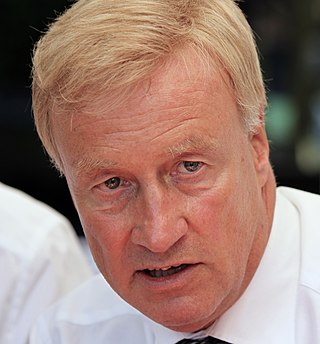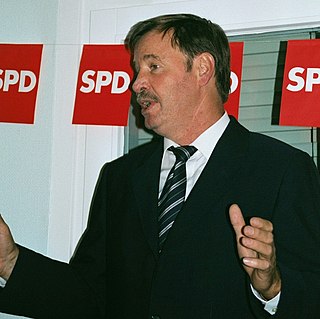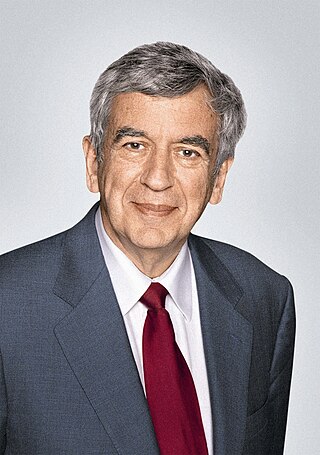
The Free Democratic Party is a liberal political party in Germany.

Alliance 90/The Greens, often simply referred to as Greens, is a green political party in Germany. It was formed in 1993 by the merger of the Greens and Alliance 90. The Greens had itself merged with the East German Green Party after German reunification in 1990.

The German Democratic Party was a liberal political party in the Weimar Republic, considered centrist or centre-left. Along with the right-liberal German People's Party, it represented political liberalism in Germany between 1918 and 1933. It was formed in 1918 from the Progressive People's Party and the liberal wing of the National Liberal Party, both of which had been active in the German Empire.

Klaus Wowereit is a German politician of the Social Democratic Party (SPD) and was the Governing Mayor of Berlin from 21 October 2001 to 11 December 2014. In 2001 state elections his party won a plurality of the votes, 29.7%. He served as President of the Bundesrat in 2001/02. His SPD-led coalition was re-elected in the 2006 elections; after the 2011 elections the SPD's coalition partner changed from the Left to the Christian Democratic Union. He was also sometimes mentioned as a possible SPD candidate for the Chancellorship of Germany (Kanzlerkandidatur), but that never materialized.

The Christian Democratic People's Party of Switzerland, also called the Christian Democratic Party, Democratic People's Party and Swiss Christian Democratic Party, was a Christian democratic political party in Switzerland. On 1 January 2021, it merged with the Conservative Democratic Party of Switzerland (BDP/PBD) to form The Centre, which now operates at the federal level. The Christian Democratic People's Party will continue to exist at the cantonal level as individual local and regional parties determine their status. Its 28 seats in the National Council and 13 seats in the Council of States were transferred to the new party, as was its sole seat on the Federal Council, held by Viola Amherd.
Ronald Barnabas Schill is a former German judge, the founder of the German political parties Party for a Rule of Law Offensive and Pro DM/Schill. He served as the Senator of the Interior and Second Mayor in the government of Hamburg from 2001 to 2003.

Ole von Beust is a former German politician who was First Mayor of Hamburg from 31 October 2001 to 25 August 2010, serving as President of the Bundesrat from 1 November 2007 on for one year. He was succeeded as mayor by Christoph Ahlhaus.

The 2004 Hamburg state election was held on 29 February 2004 to elect the members of the 18th Hamburg Parliament. The election was triggered by the collapse of the coalition government between the Christian Democratic Union (CDU), Party for a Rule of Law Offensive (PRO), and Free Democratic Party (FDP). The election saw a collapse in support for PRO which had split after its leader Ronald Schill left in 2003. The original party and Schill's new party captured 3.5% of the vote between them, down from 19.4% in 2001. A huge amount of support flowed to the CDU, which won 63 of the 121 seats in Parliament, forming a majority government. First Mayor Ole von Beust continued in office.

The 2001 Hamburg state election was held on 23 September 2001 to elect the members of the 17th Hamburg Parliament. The incumbent coalition government of the Social Democratic Party (SPD) and Green Alternative List (GAL) led by First Mayor Ortwin Runde was defeated, ending 44 years of uninterrupted SPD rule in the city-state.

Die Partei für Arbeit, Rechtsstaat, Tierschutz, Elitenförderung und basisdemokratische Initiative, or Die PARTEI, is a German political party. It was founded in 2004 by the editors of the German satirical magazine Titanic. It is led by Martin Sonneborn. In the 2014 European Parliament election, the party won a seat, marking the first time that a satirical party has won a seat to the European Parliament. With the 2019 European Parliament election, the party gained a second seat, held by Nico Semsrott.

Peter Harry Carstensen is a German politician of the Christian Democratic Union (CDU). From 2005 to 2012 he was Minister President of the state of Schleswig-Holstein, serving as President of the Bundesrat in 2005/06.

The All-German Bloc/League of Expellees and Deprived of Rights was a right-wing political party in West Germany, which acted as an advocacy group of the Germans fled and expelled in and after World War II.

Michael Naumann is a German politician, publisher and journalist. He was the German secretary of culture from 1998 until 2001. He is married to Marie Warburg, daughter of Eric Warburg and granddaughter of Max Warburg.

The 2008 Hamburg state election was held on 24 February 2008 to elect the members of the 19th Hamburg Parliament. The incumbent Christian Democratic Union led by First Mayor Ole von Beust government lost its majority. The CDU subsequently formed a coalition government with the Green Alternative List. This was the first time the CDU had formed a state government with the Greens in Germany.
The government of Hamburg is divided into executive, legislative and judicial branches. Hamburg is a city-state and municipality, and thus its governance deals with several details of both state and local community politics. It takes place in two ranks – a citywide and state administration, and a local rank for the boroughs. The head of the city-state's government is the First Mayor and President of the Senate. A ministry is called Behörde (office) and a state minister is a Senator in Hamburg. The legislature is the state parliament, called Hamburgische Bürgerschaft, and the judicial branch is composed of the state supreme court and other courts. The seat of the government is Hamburg Rathaus. The President of the Hamburg Parliament is the highest official person of the Free and Hanseatic City of Hamburg. This is a traditional difference to the other German states. The president is not allowed to exert any occupation of the executive.

Christoph Ahlhaus is a German politician. He is a representative of the German Christian Democratic Union which he joined in 1985. He was the mayor of Hamburg from August 2010 to March 2011.

Herlind Gundelach, is a German politician of the German Christian Democratic Union.
Mario Mettbach was a German politician from Hamburg and a representative of the Christian Democratic Union (CDU) and the Party for a Rule of Law Offensive.

The 2011 Hamburg state election was held on 20 February 2011 to elect the members of the 20th Hamburg Parliament. The election was triggered by the collapse of the coalition government between the Christian Democratic Union (CDU) and the Green Alternative List (GAL), which had governed the state since 2008. The election was a landslide defeat for the CDU, which lost half its voteshare and seats. The margin of defeat for the incumbent Ahlhaus Senate is the largest in post-war German history and has not been met since. Much of this lost support flowed to the Social Democratic Party (SPD), which won 62 of the 121 seats in Parliament, forming a majority government led by Olaf Scholz.

The SPD Hamburg, officially SPD State Organisation Hamburg, is the state organisation of the Social Democratic Party of Germany in Hamburg and is the state association with the largest membership of any party in the city state.















